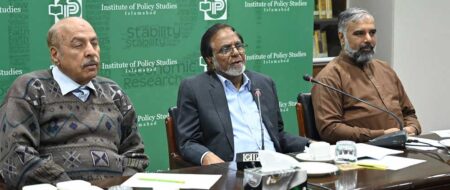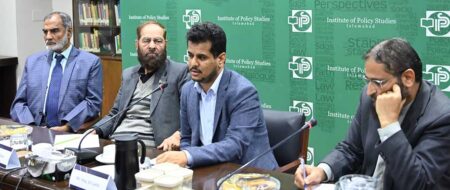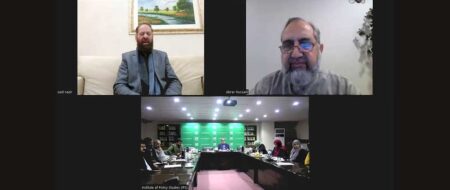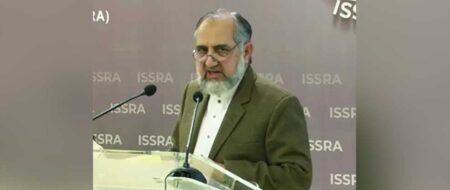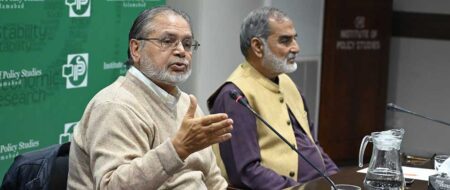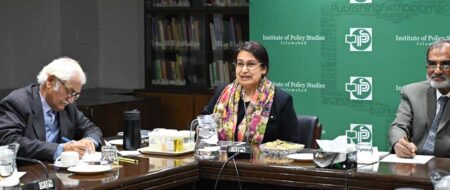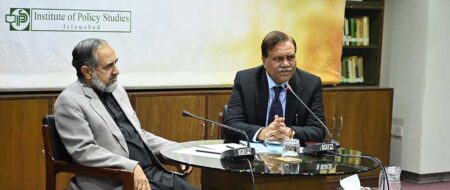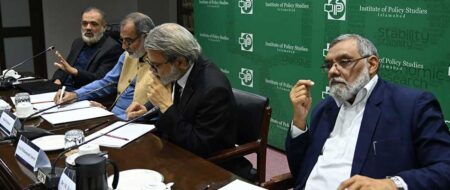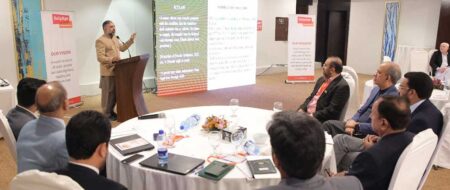Seminar on “Pak-US Relations – Status and the Road Ahead”
It was settled that there were two options for Pakistan in the current situation: to make positive changes in its foreign policy, which will focus not only on the US but on other major powers equally; second, to practice highly skillful diplomacy to muddle out of the present fix in which it was not being allowed by the US to take decisions in its own national interest vis-à-vis issues like dialogues with Taliban, Pak-Iran gas pipeline project, etc.
 The seminar titled “Pakistan-US Relations: Status and the Road Ahead” was addressed by M. Akram Zaki, former senator and general secretary, foreign affairs, Dr. Tahir Amin, Director, National Institute of Pakistan Studies, Quaid-i-Azam University, and Khalid Rahman, DG-IPS. It was attended by a number of diplomats, researchers, students and officials of concerned departments.
The seminar titled “Pakistan-US Relations: Status and the Road Ahead” was addressed by M. Akram Zaki, former senator and general secretary, foreign affairs, Dr. Tahir Amin, Director, National Institute of Pakistan Studies, Quaid-i-Azam University, and Khalid Rahman, DG-IPS. It was attended by a number of diplomats, researchers, students and officials of concerned departments.
M. Akram Zaki said that the US considers Pakistan a ‘friend enemy’ and apparently its only interests left with us were in counter terrorism and nuclear non-proliferation.
Terming the present situation of Pak-US relations as ‘a catholic marriage on rocks’, he said that it was becoming increasingly difficult for Pakistan to maintain stable relationship with the US. However, in order to manage it in a better way it was essential that the US public was convinced on our standpoints, including the stopping of drone attacks, etc.
He said that the age of having friends and enemies between states was over and now all countries look for their national interests by identifying the areas of common and contradictory concerns.
He also stressed that Pakistan’s relationship with US was a vital one and it has many dimensions. He hoped that despite of being unstable, the two countries will have a future of long term cooperation. He termed the revival of strategic dialogues to be held between Pakistan and US by the end of January as a step in the right direction.
He was of the view that despite having ups and downs historically in their relationship, the two countries have a future of long term cooperation.
In his keynote speech earlier, Dr Tahir Amin stressed that Pakistan should evaluate the cost and benefits of its involvement in the war against terrorism and determine the direction for future as per its national interest.
He mentioned that as per Snowden’s revelations fifty percent of US CIA’s black budget is spent on surveillance of Pakistan’s nuclear program.
The speaker discussed four dimensions of Pak-US relations in his presentation: historical background; areas of convergence and divergence; nature of relationship between Pakistan and US after exit of US forces from Afghanistan in 2014; and policy options for Pakistan with regard to Pak-US relations.
He was of the view that strategic relationship between the two countries was mere rhetoric.
He said that the stability in Afghanistan was a potential point of convergence between the two countries, but the drone strikes and war on terror act as divergence points. He also criticized the contradictory role of US in sabotaging Pakistan’s efforts to hold dialogues with Taliban by the use of drones, while attempting to negotiate with the Taliban in Afghanistan at their end.
The speaker also pointed that the withdrawal of U.S forces from Afghanistan by the end of 2014 will have multidimensional consequences on Pakistan as well as other neighboring countries. He said that in order to deal with that situation, Pakistan should diversify its foreign policy and try broadening and strengthening its relations with other major powers such as Russia and China.
Other participants of the seminar also took shared their views on the subject and said that it was imperative to put our own house in order first so that the required political and economic stability for strong and skillful diplomatic efforts could be provided.



